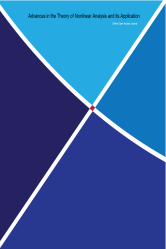Regional Controllability for Caputo Type Semi-Linear Time-Fractional Systems.
Regional Controllability for Caputo Type Semi-Linear Time-Fractional Systems.
Regional Controllability, Fractional Calculus, Caputo Time-Fractional Systems Fixed Point Theorems, HUM Approach, Compact Operators,
___
- [1] G. M. Bahha, Fractional optimal control problem for differential system with control constraints, Filomat 30 (2016) 2177- 2189.
- [2] R. F. Curtain and H. Zwart, An introduction to in?nite-dimensional linear systems theory, Springer-Verlag, New York (1995).
- [3] S. R. Duraisamy, P. Sundararajan,& K. Karthikeyan, Controllability problem for fractional impulsive integrodifferential evolution systems of mixed type with the measure of noncompactness, Results in Nonlinear Anal. 3 (2020) 85-99 .
- [4] M. M. El-Borai, Some probability densities and fundamental solutions of fractional evolution equations, Chaos Soliton. Fract. 14 (2002) 433-440.
- [5] A. El Jai and A.J. Pritchard, Sensors and actuators in distributed systems analysis, Ellis Horwood series in Applied mathematics, Wiley, New York (1988).
- [6] G. Fudong, C. YangQuan, K. Chunhai, Regional analysis of time-fractional diffusion processes, Springer International Publishing (2018).
- [7] G. Fudong, C. YangQuan, K. Chunhai, Regional Controllability analysis of fractional diffusion equations with Riemann- Liouville time fractional derivatives, Automatica 76 (2017) 193-199.
- [8] G. Fudong, C. YangQuan, K. Chunhai, On the regional controllability of the sub-diffusion process with Caputo fractional derivative, Fract. Calc. Appl. Anal. 19 (2016) 1261-1281.
- [9] M. Kandasamy, A. Annamalai, Existence results for fractional integrodi?erential systems with interval impulse via sectorial operator, Results in Nonlinear Anal. 2 (2019) 169-181 .
- [10] A. A. Kilbas, H.M.Srivastava, J.J.Trujillo, Theory and applications of fractional di?erential equations, Elsevier (2006).
- [11] J. L. Lions and E. Magenes, Problèmes aux limites non homogènes et applications, Dunod, Paris 1 (1968).
- [12] J. L. Lions, Contrôlabilité exacte perturbation et stabilisation des systèmes distribués, Masson (1988).
- [13] Y. Louartassi, A new generalization of lemma Gronwall-Bellman, Applied Mathematical Sciences 6 (2012) 621-628.
- [14] A. Pazy, Semigroups of Linear Operators and Applications to Partial Di?erential Equations, Applied Mathematical Sci- ences. New York 44 (1983).
- [15] R. Sakthivel, Y. Ren and N. I. Mahmudov, On the approximate controllability of semilinear fractional di?erential systems, Comput. Math. with Appl. 62 (2011) 1451-1459.
- [16] P.J. Torvik, R.L. Bageley, On the appearance of the fractional derivative in the behavior of real materials, J. Appl. Mech.-T. ASME 451 (1984) 294-298.
- [17] J. Wang and Y. Zhou, A class of fractional evolution equations and optimal controls, Nonlinear Anal. Real World Appl. 12 (2011) 262-272.
- [18] E. Zerrik, A. El Jai and A. Boutoulout, Actuators and regional boundary controllability of parabolic system, Int. J. Syst. Sci. 31 (2000) 73-82.
- [19] E. Zerrik, A. Kamal, Output controllability for semi-linear distributed systems, J. Dyn. Control Syst. 13 (2007) 289-306.
- [20] Y. Zhou, L. Zhang and X. H. Shen, Existence of mild solutions for fractional evolution equations, J. Integral Equ. Appl. 25 (2013) 557-586.
- [21] Y. Zhou and F. Jiao, Existence of mild solutions for fractional neutral evolution equations, Comput. Math. with Appl. 59 (2010) 1063-1077.
- Başlangıç: 2017
- Yayıncı: Erdal KARAPINAR
Spectral Theorem for Compact Self -Adjoint Operator in Γ -Hilbert space
Nırmal SARKAR, Sahın Injamamul ISLAM, Ashoke DAS
A simple proof for Kazmi et al.'s iterative scheme
Nonlocal Fractional Differential Equation On The Half Line in Banach Space
Kheireddine BENİA, El Hadi Ait DADS, Moustafa BEDDANİ, Benaouda HEDİA
LOWER SEMI-CONTINUITY IN A GENERALIZED METRIC SPACE
Neumann and Mix Boundary Value Problems on the Upper Half Plane
Some Generalized Special Functions and their Properties
Shahid MUBEEN, Syed SHAH, Gauhar RAHMAN, Kottakkaran NİSAR, Thabet ABDELJAWAD
Adel LACHOURİ, Abdelouaheb ARDJOUNİ
Analysis of a fractional boundary value problem involving Riesz-Caputo fractional derivative
Abdellatif BOUTİARA, Naas ADJİMİ, Maamar BENBACHIR, Mohammed ABDO
Regional Controllability for Caputo Type Semi-Linear Time-Fractional Systems.
Fatima Zahrae EL ALAOUİ, Ali BOUTOULOUT, Asmae TAJANİ
